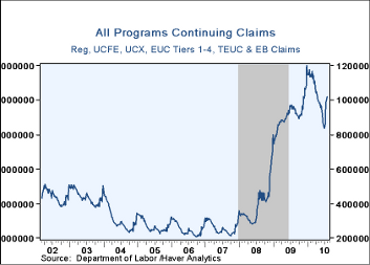 Global| Aug 26 2010
Global| Aug 26 2010U.S. Jobless Insurance Claims Retreat As Census-Worker Layoffs Near End
by:Tom Moeller
|in:Economy in Brief
Summary
Perhaps, recent indications of sequential deterioration in the labor market have topped out. Initial claims for unemployment insurance fell last week to 473,000 from 504,000 the week prior (originally 500,000). Claims were the lowest [...]
 Perhaps, recent indications of sequential deterioration in the labor market
have topped out. Initial claims for unemployment insurance fell last week to
473,000 from 504,000 the week prior (originally 500,000). Claims were the lowest
in four weeks when individuals who took the Census began wrapping up their work.
Nevertheless, the 4-week moving average rose to 486,750, their highest since
November of last year. The latest weekly decline outpaced Consensus forecasts
for a drop to 490,000. During the last ten years there has been a 78%
correlation between the level of initial unemployment insurance claims and the
m/m change in payroll employment.
Perhaps, recent indications of sequential deterioration in the labor market
have topped out. Initial claims for unemployment insurance fell last week to
473,000 from 504,000 the week prior (originally 500,000). Claims were the lowest
in four weeks when individuals who took the Census began wrapping up their work.
Nevertheless, the 4-week moving average rose to 486,750, their highest since
November of last year. The latest weekly decline outpaced Consensus forecasts
for a drop to 490,000. During the last ten years there has been a 78%
correlation between the level of initial unemployment insurance claims and the
m/m change in payroll employment.
Continuing claims for state-administered programs edged down to 4.456M during the week of August 14 while the associated unemployment rate dipped to 3.5%. These claimants are, however, only about half of the total number of people currently receiving unemployment insurance. The regular extended benefits program, with eligibility dependent on conditions in individual states, surged to 937,756 on August 7, the latest available figure. In July, the Congress renewed the special Emergency Unemployment Compensation program referred to as EUC 2008; by August 7th, also the latest available for this program, it had 4.9 million beneficiaries. It will now accept claims through November 30 and will be continuing to pay out benefits until April 30, 2011.
Haver Analytics calculates a grand total of all claimants for unemployment insurance; this series includes extended and emergency programs as well as selective programs for railway employees, recently discharged veterans and federal employees. All together, on August 7th, the total number of recipients was 10.2 million, up 7.6% y/y but down from the early-January high of 12.0 million. These data are not seasonally adjusted.
Data on weekly unemployment insurance programs are contained in Haver's WEEKLY database and summarized monthly in USECON. Data for individual states, including the unemployment rates that determine individual state eligibility for the extended benefits programs and specific "tiers" of the emergency program, are in REGIONW, a database of weekly data for states and various regional divisions. Action Economics consensus forecasts for a collection of major economic indicators are contained in the AS1REPNA database.
| Unemployment Insurance (000s) | 08/21/10 | 08/14/10 | 08/07/10 | Y/Y | 2009 | 2008 | 2007 |
|---|---|---|---|---|---|---|---|
| Initial Claims | 473 | 504 | 488 | -16.6% | 572 | 419 | 321 |
| Continuing Claims | -- | 4,456 | 4,518 | -26.4 | 5,809 | 3,340 | 2,549 |
| Insured Unemployment Rate (%) | -- | 3.5 | 3.6 | 4.6 (08/09) | 4.4 | 2.5 | 1.9 |
| Total Continuing Claims* (000's, NSA) | -- | -- | 10,198 | +7.6% | 9,085 | 3,884 | 2,584 |
* Calculated by Haver Analytics, as the sum of regular state programs, extended benefits, federal employees, veterans, railroad retirement board and "EUC" 2008.
Tom Moeller
AuthorMore in Author Profile »Prior to joining Haver Analytics in 2000, Mr. Moeller worked as the Economist at Chancellor Capital Management from 1985 to 1999. There, he developed comprehensive economic forecasts and interpreted economic data for equity and fixed income portfolio managers. Also at Chancellor, Mr. Moeller worked as an equity analyst and was responsible for researching and rating companies in the economically sensitive automobile and housing industries for investment in Chancellor’s equity portfolio. Prior to joining Chancellor, Mr. Moeller was an Economist at Citibank from 1979 to 1984. He also analyzed pricing behavior in the metals industry for the Council on Wage and Price Stability in Washington, D.C. In 1999, Mr. Moeller received the award for most accurate forecast from the Forecasters' Club of New York. From 1990 to 1992 he was President of the New York Association for Business Economists. Mr. Moeller earned an M.B.A. in Finance from Fordham University, where he graduated in 1987. He holds a Bachelor of Arts in Economics from George Washington University.








